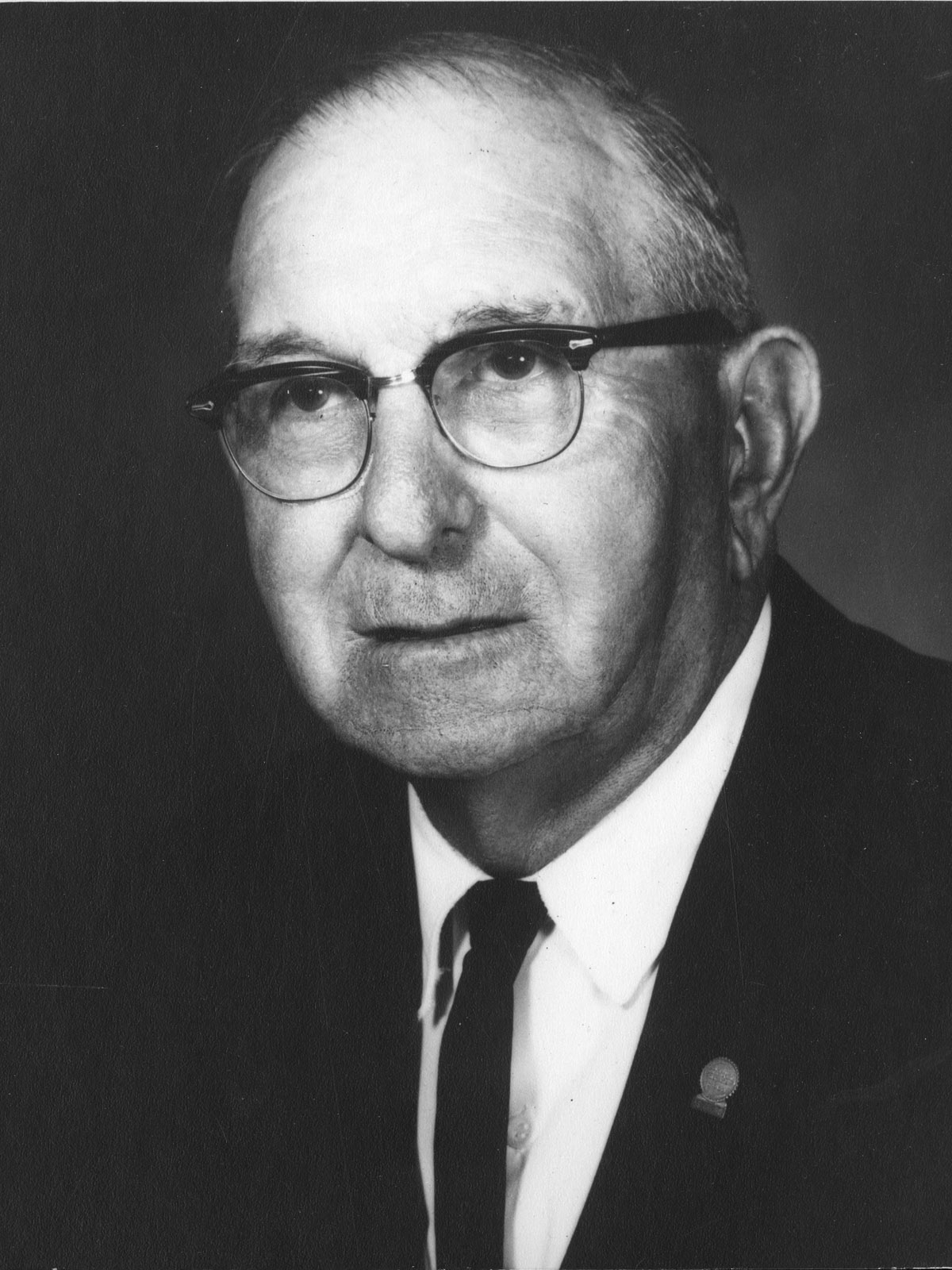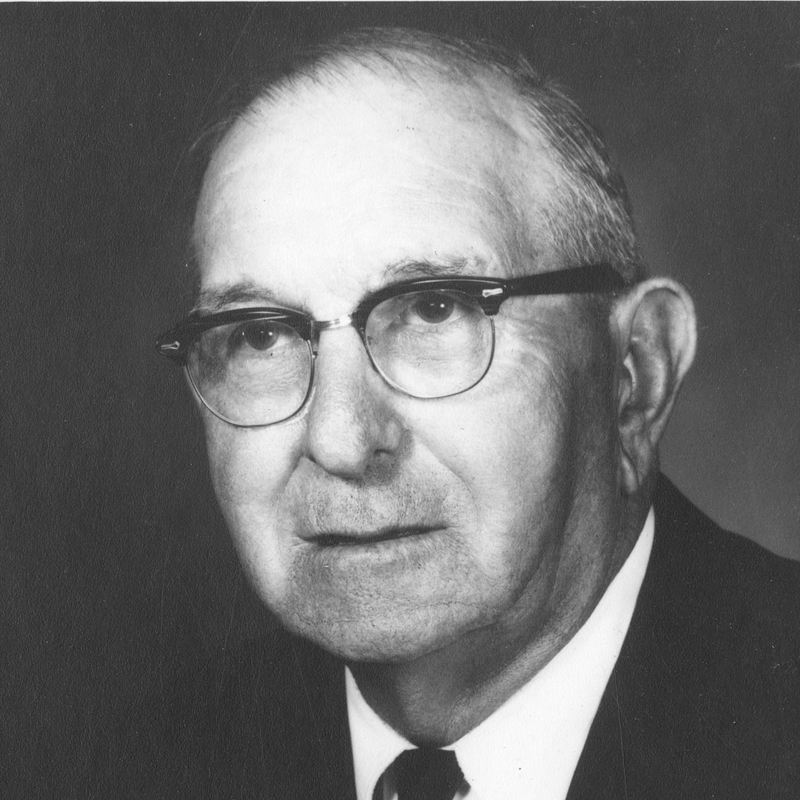
Emmett Lee was a successful Greeley County farmer who had a variety of interests and responsibilities. He was Director of the Soil and Water Conservation District for 30 years; was involved with the State Farmers Home Administration Board for 15 years; and was an instructor for the “On-the-Farm Training” program for 11 years.
Not long ago I read a book in which the author said,
“Our national agriculture is guided by leaders not wise enough to agree; by politicians whose success is measured in votes; and by economists who have never been hungry.”
I don’t subscribe to this philosophy for a number of reasons, but principally because I believe the direction and success of our agriculture come more nearly from a few farmers and ranchers who have been willing to experiment, to try new things, and to give leadership to those ideas or procedures they thought were right.
Tonight we are here to honor one of these leaders.
The Officers of the Nebraska Hall of Agricultural Achievement are to be commended for selecting Emmett J. Lee for recognition. You have made a fine choice, and it is my distinct privilege to recount briefly some of the reasons why your selection of Emmett as the honoree for 1968 is especially appropriate.
First let me describe a background that makes your recipient about as truly and typically a native Nebraskan as possible.
Emmett Lee was born in 1896, a year of less than normal rainfall, and a depression year with corn bringing 13 cents a bushel. He was born of Irish parents in the Irish community of Greeley County. His birthplace was south and east of Spalding on the farm his grandfather had acquired through the “Tree Claim” Act. Further, it was typical that Emmett attended a country school and then high school in Spalding. At that time, too, a small college was located in Spalding and here Emmett spent two years.
In 1918 Emmett was married to Mary Ellen Darcy of Creighton, Nebraska. Emmett and Mrs. Lee celebrated their golden wedding anniversary last July. I’m sure that the outstanding men who previously have been recognized by the Hall of Agricultural Achievement have each been encouraged and supported by their wives. Certainly, it is true with the Lee’s. The impressive list of Emmett’s accomplishments is due in no small measure to an understanding and helping wife.
Emmett began farming on the home place in 1915. It was there three years later that he brought the new Mrs. Lee. To their union were born two boys and five girls. One sone and four daughters are living. The Lee’s also raised an orphaned niece and nephew.
Emmett bought the home farm in 1929. Here he raised his family and sent them to school, and all five attended college. Emmett was, and is, a successful farmer and cattle feeder. And although this is not why we honor him tonight, I would point out this is no small matter. I don’t think I’m revealing any confidences when I tell you Greeley County is not the most productive agricultural county in the State. The fact that Emmett prospered through a depression and dust storms -- the fact that he fed cattle -- that he put down the first irrigation well in his area -- would make one question how he had time for anything else, -- but he found time.
Fortunately for Nebraska, Emmett Lee is one of those people who cannot remain inactive when there are ideas to promote or community projects in need of leaders.
In the Army it was called “above and beyond the call of duty.” I don’t know of a comparable description for farmers, but I’m sure there is no phrase that would do justice to the time and effort Emmett has given to his community and state.
There must have been countless hours in hundreds of days and evenings that our honoree gave as a public spirited citizen.
He started the first two 4-H Clubs in Greeley County in 1928. He has been President of the Greeley County Fair Board for 28 years. Emmett was a charter member of the Production Credit Association in Grand Island. For better than eleven years he served as a Veterans instructor and was considered one of the best in the State because of his ability to impart his knowledge to younger individuals.
Emmett is Vice Preside of the Highway “91” Association. He was a member of the first committee and at one time Chairman of the Agricultural Stabilization and Conservation Service in Greeley County.
He is Chairman of the Board for School Reorganization in Nebraska. He is Chairman of the Advisory Council to the State Board for Vocational and Technical Education.
Emmett is a long time member of the Nebraska Reclamation Association, and presently is Chairman of the Loup Basin Association.
For 15 years he has been a member of the Nebraska State Advisory Committee for the Farmers Home Administration of the United States Department of Agriculture. In this capacity he advises the State Director with respect to adapting broad national policies to local conditions in the State. He advises on the needs of agricultural credit for rural residents and rural communities.
He has been of particular assistance to the FHA in Nebraska because of his intimate knowledge of rural conditions and the problems of rural people and communities.
He has found time to be an active member of St. Michael’s Catholic Church in Spalding. Church assignments have included work on the Cemetery Association, with the Boy Scouts, Social Committee, and assistance to aged.
Emmett’s positions of responsibility in education, in youth work, in rural credit, in reclamation, and in other fields are highly important, but perhaps his major contribution to the welfare of Nebraska and its citizens is dedicated activity in soil and water conservation. Emmett was the prime mover in organizing the Greeley-Wheeler Soil and Water Conservation District in 1939. This was the fifth district organized in Nebraska and when Emmett became concerned practically all cultivation in his area was parallel to property lines. The rows ran up and down hill -- each furrow a sluiceway for precious top soil when the rains came. Each downpour carried away from the fields tons of soil to be deposited in the valleys or as a pollutant in streams.
There is much conservation remaining to be done, of course, but Emmett Lee and his co-workers have made such strides that it is difficult to grasp the great changes which have taken place since the district began. And Emmett served as supervisor of his district from 1939 until 1968 -- much of the time as Chairman. His 30 years as a district supervisor is a record. No one else in Nebraska -- and few in the Nation -- have given this much time in the conservation cause.
Emmett’s dedication to conservation is not limited by county lines. He became an Area Director for the State Association of Soil and Water Conservation Districts and used his influence to promote good land use in a number of counties. He was elected to the State Soil and Water Conservation Commission in 1958, and became Chairman of the State Commission in 1961. He served as Chairman of the State Association of Soil and Water Conservation Districts from September 1965 to September 1967. His work with Government agencies, both State and Federal, and particularly with the State Legislature gave great impetus to conservation in Nebraska.
Naturally, Emmett’s contributions have been recognized. In 1962 he was given the Distinguished Service Award by the State Association. The wording on this award reads:
“In recognition of outstanding service to the citizens of Nebraska through his outstanding support and generous contribution to the Soil and Water Conservation District Program.”
He has received the Ak-Sar-Ben Agricultural Achievement Award, the Soil Conservation Society of America award, and the Goodyear Tire and Rubber Company award for outstanding service as a supervisor.
There can be no suitable recognition, however, for what he has done for the welfare of this State.
Emmett believes preservation of soil and moisture are imperative challenges if our agricultural productivity is to remain strong -- that the future itself carries a mandate for all-out husbandry of natural resources if this nation is to preserve a balance between the excesses of civilized man and the harmony of nature.
He is convinced nothing is more important to the security and strength of this nation than maintaining an efficient and productive agriculture.
And he is sure -- in future years political power will rest not with the nation with the most nuclear power, but rather with the nation whose farms are most productive.
It is with this philosophy and in this field that Emmett Lee has spent a lifetime giving freely of his enthusiastic and effective leadership. This is where he has made vital contributions, and this is why we honor him tonight.
As a distinguished citizen, community builder, and conservationist, Emmett Lee has made Nebraska -- and the Nation -- stronger.
